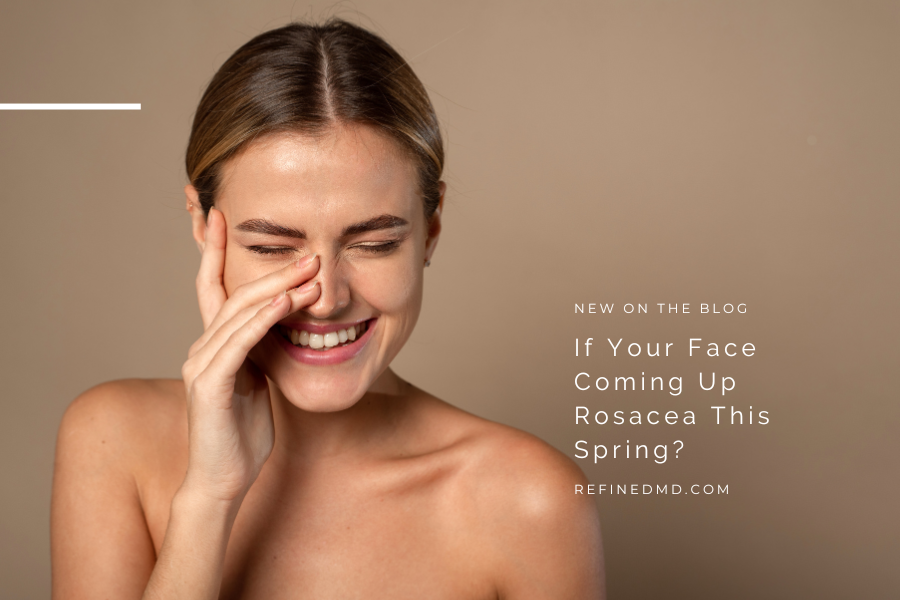
10 Apr Is Your Face Coming Up Rosacea This Spring?
Nobody knows what causes rosacea, but this common skin problem makes itself well known with deeply flushed skin. It is not dangerous or contagious, but the highly visible symptoms can make it an embarrassing condition for men and women of all ages—which is why we help control symptoms at RefinedMD. In severe cases, the blush is coupled with red, bumpy skin. Rosacea sufferers can have flareups that last for weeks or months. Sometimes rosacea is mistaken for acne, allergies, or other skin issues. Proper diagnosis is a must in order to avoid triggers and treat symptoms.
Although anyone can develop rosacea, it is most common in fair, middle-aged women. If your face is red, flushed, or bumpy for extended periods of time, it might be rosacea. Only a dermatologist can diagnose rosacea and other skin disorders.
Rosacea can also affect other areas of the face beyond the skin. Fifty percent of people with rosacea also report dry, swollen, or irritated eyes. The eyelids can also have rosacea, and a condition near such a delicate part of the face can cause permanent damage if not treated. Rosacea can also enlarge the nose by thickening the skin. Rhinophyma, or a bulbous nose, is more common in men than women.
Why Do I Have Rosacea?
Although it is unclear what causes rosacea, both genetic and environmental factors are likely at play. There is a myth that rosacea is caused by lack of hygiene—this is not true. Rosacea occurs when blood flow increases to the skin in the face, but figuring out why that happens is a bit of a mystery.
Dermatologists do know that there are common rosacea triggers. These include spicy food, alcohol, sunlight, wind, extreme temperatures, hot drinks, stress, certain drugs that dilate blood vessels, exercise, and makeup or other items applied to the skin. Systematically removing these triggers under the care of a dermatologist is the best way to determine your unique triggers.
In addition to pinpointing and avoiding rosacea triggers, there are also some people who are simply at a higher risk of the disorder. Women over the age of 30 with fair, sun-damaged skin are the most common rosacea sufferers. If you smoke or have a family history of rosacea, you’re at an even higher risk.
Rosacea Complications
Rosacea is usually not dangerous. However, in some cases the oil glands on the nose and cheeks can increase due to rosacea. This results in tissue buildup that can manifest itself as a bulbous nose. It takes many years for this to develop, which means that some rosacea patients don’t notice until the rhinophyma is very obvious. This complication is not life threatening, but must be treated with more aggressive approaches than rosacea alone.
Treating Rosacea
There is no “test” for rosacea. Instead, dermatologists rely on physical examinations to diagnose this disorder. Sometimes other conditions, like psoriasis or eczema, must be ruled out first. The only “treatment” for rosacea is avoiding triggers and treating symptoms through a skin care regimen.
Medications can help in severe cases. This includes drugs that reduce redness and are topically applied. Drugs like brimonidine can help constrict blood vessels and shows visible results in as little as 12 hours. This is a temporary solution, similar to acne topical treatments.
Oral antibiotics may also be recommended. These drugs can minimize bacteria growth while fighting inflammation. Severe cases of rosacea may be treated with isotretinoin. This oral acne medication can also target rosacea lesions that have similar properties as acne.
Rosacea Therapies
In-office therapies are often recommended to treat rosacea symptoms. The most popular options are laser skin therapies, and RefinedMD has one of the largest collections of lasers in the Phoenix/Scottsdale area. Laser skin therapy can help reduce redness and blood vessel size.
Microdermabrasion can be effective in reducing a bulbous nose. Combine IPL (intense pulsed light therapy) with either of these treatments for even more dramatic results.
Avoiding your triggers is the best way to reduce rosacea flareups. You should also be vigilant about protecting your face daily with sunscreen and hats. Scarves and ski masks in the winter can also help. Gentle skin treatment is also a must, such as using a gentle cleanser and avoiding rubbing the skin. Minimizing makeup wear and being wise with choices, such as organic products with a green tint to combat redness, can reduce the signs of rosacea.
We are committed to diagnosing and treating your rosacea. There are multiple approaches available to minimize flareups and minimize the signs of rosacea. Contact RefinedMD today by calling the office or filling out the online form.
